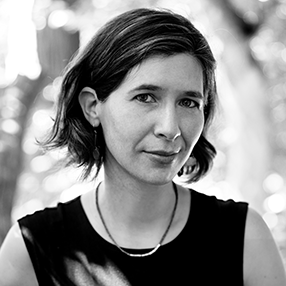Value City
Under the marked-down dresses, we conjured trips to Oslo.
Also to Lima. Mel says the game was my idea, hiding
behind hundreds of hems, inventing trips to cities we knew
only as pleasing arrangements of letters, places we’d likely
never see. Mel says it’s how she remembers me: cross-legged, knotting
lengths of licorice, traveling the planet under racks of final sales.
A rhinestone belt fell on my head once, she says, and I kept on talking
about Alaska, the claws of King Crabs we’d crack open and taste
the arctic, find out what we were missing at Red Lobster. Our travels
to nowhere, she says, lasted beyond the training bras
we compared in the dressing room. So what explains it, my failure
to recall these conjured trips, or why my psyche delivers words
from a woman I never sat with under packed rows
of dresses—the poet Fanny Howe asking what keeps the temple
of imagination burning with candles against all odds, whether it remains
behind a nipple and a bone? This fraught asymmetry with Mel occurs
after our nipples became a milk source. We’re older, bowling by chance
in adjacent lanes, recognizing each other most from the bodies
of our children—echoes of ourselves in their noses, a familiar drop
in their shoulders. How’s it possible, Mel asks, you recall none of it,
not even the red stickers that stuck to our palms? You must
remember picking off those stickers, she insists—amid news
of her divorce, her interest in crystals. I deliver trivia
about my long-haired sons bowling into the gutter, about my brother
who bowls much better, and still lives in town. New pins lower
like sets of dentures, get swept again into the open jaws
of our separate lanes. There’s no saying it: my betrayal. How else
to name the absence of our game in my mind? The thick clouds
over Lima, I remember; I got there after college, saw
the bronze rear of Pizarro’s horse before protesters heaved
his pedestal to the ground. Alaska, too, I got to see, confused
the sound of calving glaciers with the blasts of rifles
I knew here, where Mel’s continued through forty years
of deer season, the few weeks each November
for shooting bears. If I’d stayed, had Oslo remained
a sonic cluster, would my lack of recall rub less? Guilt
is what floods me at my swift retrieval of Fanny Howe’s lines
but not the hems in Value City. I tell Mel the rhinestone belt
must’ve done something to my brain. We hug, exchange numbers
we’ll never use. If there’s a temple beyond glands and bone
for all that goes blank in a lifetime, maybe it resides in the body
of a poem, in meanings left between the spread knees
of enjambment. The next bowlers go live on the lane screens:
Eddie Wins, JP the Dream Pony, La Reina Carla, and CU
on the Moon. Reader, some of these names are flourishes
for the sake of this poem. Eddie Wins, he’s up there. Also Carla,
but with no bravado. CU on the Moon is true; someone assuming
our lane has lunar plans and wants a companion. Maybe Carla.
Maybe JP, who prefers to keep his dream pony to himself.
Copyright © 2024 by Idra Novey. Originally published in Poem-a-Day on October 15, 2024, by the Academy of American Poets.
“I knelt in the temple of imagination for much of my childhood. In Fanny Howe’s spectacular book Second Childhood, she poses a number of questions about that ‘temple,’ [and] what causes the imagination to go on burning against all odds. This poem began with someone else’s memory of hiding with me in a discount store while I imagined us traveling to Alaska. I have no memory of my imagination burning against all odds in Value City. I know it happened though; I still have a hat from the final sales from that store.”
—Idra Novey

